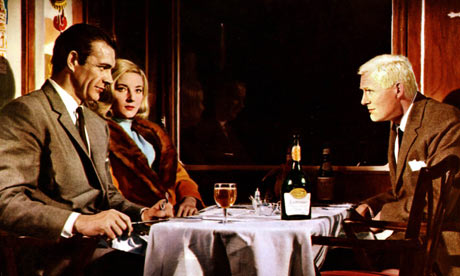When I wasn't watching Champions League on a Tuesday night during my teenage years, I was watching James Bond. RTE had what seemed like a never-ending "Bond Season," and I lapped up every minute of it. I have a strange affection, then, for a promiscuous, murderous agent of the empire, and I have an ideal Bond film - From Russia With Love - against which all other Bond films are measured.
Against this measure, Spectre is found wanting. Like the other Daniel Craig outings, this just doesn't feel like a James Bond film. It feels more like a slightly (but only slightly) camper version of the Bourne series. Spectre makes this shift in tone explicit in its portrayal of Bond as an assassin.
The Bond that I remember from those Tuesday nights was no assassin. He was a spy. Killing wasn't something that Bond set out to do. It was what got in the way of sleeping with women and gambling at luxurious casinos. Bond lived an extravagant life, moving from one fancy hotel to the next, having no attachments, no roots, no mundane responsibilities. Bond's mission was to see what's going on over in X. He would go, he would make his presence known, he would get shot at or chased or both, he would do some investigative work, he would land himself in deep trouble, and he would find a way out of it. To reduce him to a hired gun is to strip him of everything that makes him who he is. This is what has happened since Daniel Craig took the wheel.
I have some sympathy with this new direction. I have some sympathy because I have seen Die Another Day. But this is not the way to go.
The best way to illustrate the gulf in class between a classic Bond film like From Russia With Love and Spectre is to compare the train sequences in both films. In the former, we spend quite a bit of time on the train with Bond and his female accomplice. There is a tension to this trip, because we know that the bad guy is somewhere on board the train, but Bond doesn't know. Indeed Bond ends up having dinner with him, unaware that he is dining with the man sent to kill him. This all builds to a dramatic showdown, where one of Q's gadgets comes to save the day. This is brilliant film making. It is brilliant because it devotes time to this sequence, and time means tension.
Contrast this to Spectre. The train sequence receives no time at all. We are given no time to see the relationship between Bond and Dr Madeleine Swann. We're just on a train because a train is a cool place to shoot an action sequence. The bad guys shows up unexpectedly, starts fighting Bond, and Bond wins. It's all rather dreary, because no time has been devoted to it, and therefore no tension has been allowed to develop. For another example of this dreariness, watch the car chase in Rome. It is, without doubt, the most boring car chase in the history of cinema.
It's time for Bond to have a good, long look in the mirror. It's time for some screenwriter to look back at the best Bond films and analyse why they were so good. (Aside: when you see that a film has four screenwriters you know that something fishy is going on. Spectre wears this multiplicity of writers heavily, suffering as it does a complete lack of continuity.) And it's time for Daniel Craig to step down. Perhaps James Bond as espionage's Don Juan is a character that just doesn't work any longer. The world is smaller now, and Bond's extravagant lifestyle isn't as extravagant these days. Spectre at least tried to make a case for our need of James Bond. It just didn't make a convincing one, because the Bond it tried to justify was no Bond at all.

